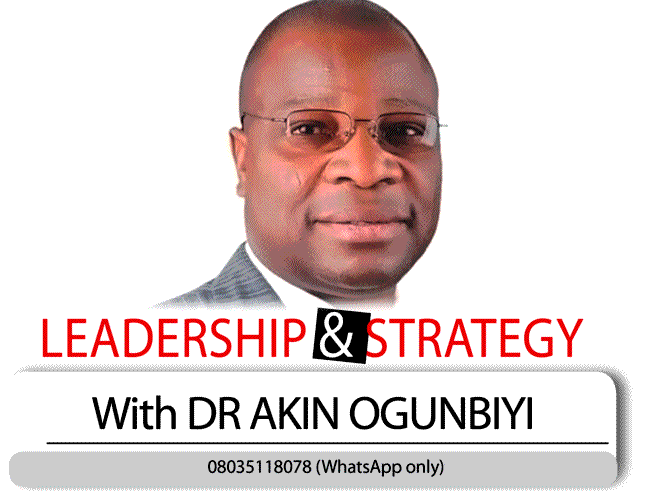Last week, I was keynote speaker at one of the high-flying theological institutions in South-West Nigeria. I spent about two hours discussing leadership as a tool for excellence.
Each time I have had to discuss leadership, there is always something new to say. There is also that great distinction between leadership and management that I always need to stress. We are always reminded that a leader leads people and not just manage money, time and quality, the three key drivers of good products and services.
Leadership, especially in business organisations is not showmanship. The leader must empower the workforce and not struggle for “space” with colleagues. The leader guides. He leads by example and must therefore “go into the trenches” with the people. His demeanor must be “down-to-earth” humility and his tonality (as I explained in this column last week) must be a gentle mien in order to relate meaningfully with his people and also inspire them. He must build connection and confidence. He must not stifle his people but always make sure things are done excellently.
The leader must get his people to believe in themselves and motivate themselves because his success can only be measured by how well his people succeed. He must give them the tools to maximally achieve their abilities and deliver at their best always. He must achieve great results with the team and also produce great talents for future leadership roles. Great leaders must with empathy, “enter” the shoes of those they lead. The leader must always remember that the language of leadership is “purpose” or “intent.”
Today’s leader must exhibit 360 degrees’ leadership. This flows from the “bottom-up” and “top-down.” He must have a sense of duty and unflinching loyalty to his organisation’s goals and objectives. He must be an epitome of integrity and courage. Also, be convincing and insightful. Ability to solve problems and challenges with perseverance is the hallmark of great leaders. Perseverance drives enviable character and of course, character delivers hope.
A former Vice President of the Federal Republic of Nigeria pointed out that the success or failure of the leader will be determined by his ownership and exhibition of character-based values. He defined these values as “ethical principles by which individuals and communities live, work and interact.”
The leader’s paths to success are creativity, innovation and entrepreneurship. His success will be gauged by how well he leads his team along these three critical paths.
Creativity is the ability to generate new ideas that will be used for innovation. Innovation uses new ideas, patterns and processes to produce new things that the entrepreneurial leader will (with his team and on the platform of his organisation) deliver to the people as benefits and outcomes.
Today’s leader will find it very difficult to succeed with a single portfolio career but versatility and adaptability will make achieving success a lot easier. When effectiveness fades, the leader must re-evaluate and adapt. He must work very hard with his team to achieve excellent results by way of maximum productivity and profitability for his organisation. He must strive for expertise in communication skills, presentation skills, group and team skills, listening and conversation skills.
Let me conclude with what I have always referred to as “critical leadership tools or leadership essentials.” They are courage, humility, empathy and “zero ego”, plus additional knowledge and good life balance.
Courage is a critical characteristic of leadership. The effective leader advances vision with courage. He does not vacillate or waver. He takes risks on people. He believes in people. He speaks the truth and does the right things with integrity. As a phenomenal leader, he is bold.
Humility is when an effective leader knows that character is central to leadership. The team must trust him and be convinced he has their interests at heart. The leader must always rise above himself to inspire others. Followers believe you are right even if they have doubts. The leader who has been given authority plus power, must use the two for the good of others. Common sense dictates that a leader must be incredibly humble because it is impossible for you to be an expert in everything.
Humility enables the leader to grow and not closed to new ideas. When you listen to others and you encourage criticisms, you inadvertently, allow your colleagues to plug your gaps.
Ego is a no-no in leadership. Its only function is usually “biased” judgment. With ego, decisions will not be on good data but the emotional corruption of data. You cannot interpret or adapt to reality with ego.
The leader must not fuel ego by always sympathizing with people instead of showing empathy. He must bypass ego and challenge colleagues to greatness. The leader heals the “hurt” of colleagues.
Acumen or the quickness of perception or discernment is by and large, determined by the learning mindset. The leader must nurture acumen in order to avail himself with necessary tools for leadership.
I have a voracious appetite for knowledge. I desire new and additional knowledge always. Leaders must invest in their growth by aligning aspirations with excellent values.
Finally, the leader must live a healthy life through regular exercise, healthy eating and adequate rest.
READ ALSO: Leadership backlash (II)
WATCH TOP VIDEOS FROM NIGERIAN TRIBUNE TV
- Relationship Hangout: Public vs Private Proposals – Which Truly Wins in Love?
- “No” Is a Complete Sentence: Why You Should Stop Feeling Guilty
- Relationship Hangout: Friendship Talk 2025 – How to Be a Good Friend & Big Questions on Friendship
- Police Overpower Armed Robbers in Ibadan After Fierce Struggle






